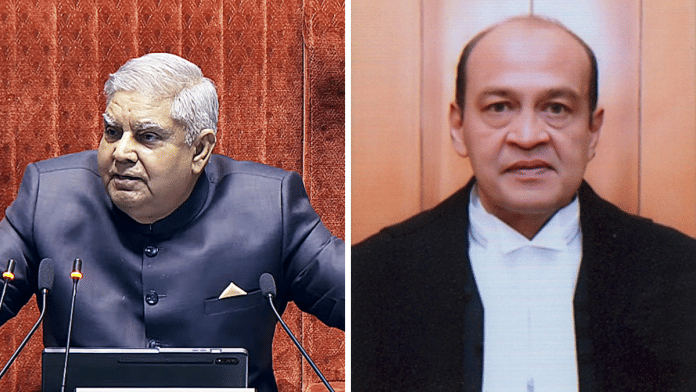New Delhi: Rajya Sabha Chairperson Jagdeep Dhankhar Monday hailed Chief Justice of India (CJI) Sanjeev Khanna, referring to the measures taken by him after the discovery of a stash of cash at the residence of Delhi High Court’s Justice Yashwant Varma as “unprecedented”.
Dhankhar praised the CJI in the presence of the Leader of the House in Rajya Sabha J.P. Nadda and Leader of the Opposition Mallikarjun Kharge, who met him over the issue, signalling that renewed efforts could be made by the government to revive the proposal to set up a National Judicial Appointments Commission (NJAC) for appointment of judges to higher courts.
Dhankhar accepted Kharge’s suggestion to call a meeting of the floor leaders of all the parties in the Rajya Sabha to discuss the issue, while asserting that such “malaise needs to be eradicated”.
The Supreme Court had formed a three-member committee comprising the chief justices of Punjab and Haryana High Court, Himachal Pradesh High Court and Karnataka High Court—Justice Sheel Nagu and Justice GS Sandhawalia and Justice Anu Sivaraman—respectively, to probe the allegations against Varma.
On Monday, the apex court issued a statement saying that its collegium, in its meeting held on 20 March and 24 March, has recommended the repatriation of Justice Varma to the Allahabad High Court.
“We had meaningful deliberation over the issue that is agitating the mind of the judiciary. It is for the first time since independence that a chief justice of India has in a transparent accountable manner put all material available to him in public domain and shared it without keeping anything with the court. This is a step in the right direction,” Dhankhar said.
His statement came before the SC’s decision to repatriate Justice Varma to the Allahabad HC. Earlier, the SC had said that the proposal to repatriate Varma was “independent and separate from the in-house enquiry procedure” initiated by the Chief Justice of the Delhi High Court upon receiving information about the incident at Varma’s residence.
Referring to the setting up of the three-member committee and the “alertness” shown by CJI Khanna, Dhankhar said, “Institutions like judiciary and legislature serve their purposes best when the in-house mechanism is effective, fast and upholds public trust.”
The V-P said it would be “worthwhile to await the outcome of the committee as that will enable us to have the entire material for our consideration”.
“A very thoughtful suggestion emanated from Kharge ji that consistent with parliamentary practice, the issue needs to be deliberated with the floor leaders. Finding the suggestion in order and with full approval of all three of us, a meeting will accordingly be scheduled where I would extend an invitation to floor leaders in the council of states to take a call on this,” Dhankhar said.
Dhankhar, who has on several occasions made strong pitches for reviving the proposal to set up the NJAC—declared unconstitutional in 2015 by the SC that upheld the prevailing collegium system of appointment of judges—said he firmly believes that the steps taken so far by CJI Khanna were “unprecedented, going by past performance”.
On 21 March, after the allegations against Justice Varma surfaced, Dhankhar, referring to the NJAC Act passed by the Parliament in 2014, had said that he would get in touch with the Leader of the House and the Leader of the Opposition to find a mechanism for a “structured discussion” on the issue
“You all will recollect the mechanism which was passed by this House with near unanimity, with no dissension, only one abstention in the Rajya Sabha, all political parties converging and going in for the initiative of the government. I wish to find out the status of that which emanated from Indian Parliament made sacrosanct by the endorsement of 16 state assemblies in the country and signed by the Hon’ble President under article 111 of the Constitution,” he had said at the time.
“That historic legislation endorsed by this Parliament with unprecedented consensual support unknown to the parliamentary history of this country dealt with the malaise very severely. If the malaise had been dealt with perhaps we would not have countenanced such kind of issues. What bothers me is that the incident happened and did not immediately surface,” he had further said.
(Edited by Gitanjali Das)
Also Read: In aftermath of Delhi HC judge row, Mahua accuses Centre of laying ground to scrap Collegium system






